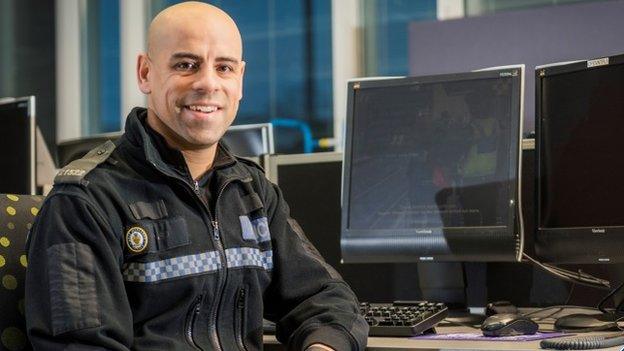Racism in sport: UK's first dedicated football hate crime police officer on tackling abuse
- Published

PC Stuart Ward, the UK's first dedicated football hate crime police officer
In the last few weeks, barely a day has gone by without racist abuse being targeted at a high-profile footballer, among them Reece and Lauren James, Marcus Rashford, Axel Tuanzebe, Romaine Sawyers and Alex Jankewitz.
Leading figures from clubs, the government, the Football Association and within the police have said more must be done to remove harmful content from online platforms, and ultimately stop it getting on there in the first place.
In January, the UK's first dedicated football hate crime police officer was appointed - PC Stuart Ward of West Midlands Police.
So what will PC Ward's role entail?
Online focus while no supporters at grounds
Ward is at the forefront of efforts by West Midlands Police to "stamp out rising abuse against footballers and fans".
At the moment, his focus is on hate crime and malicious communications online. He says they are seeing "a lot of offences reported on social media" and is leading "numerous" ongoing investigations.
One of those relates to the alleged abuse of West Bromwich Albion midfielder Sawyers.
West Midlands Police said a 49-year-old man was arrested on suspicion of sending malicious communications and has been released under investigation while enquiries continue.
Ward's remit will extend to "investigating all forms of discrimination and hate crime at football games" when Covid restrictions ease and supporters return.
Personal motivation
Ward has personal experience of being racially abused online and in person, during his childhood and in his work with the police.
He says it has had a "massive impact" on him, but believes that it will help him relate to other victims of hate crime.
"It's all too easy to be racist towards someone," he says.
"It had a massive impact on my life, but to be able to then turn that into a positive for someone else I think is really important going forward in trying to stamp these issues out completely."
Prosecution "the route we have to go down"
From the point a report comes to the police about alleged hate crime or malicious communications, Ward's team will take screenshots of the relevant messages, any details of the users and will take a statement from the player or club.
They then rely heavily on cooperation from social media platforms to help provide them with additional data.
Deputy chief constable Mark Roberts, the national lead for football policing, said Twitter took nearly six months to respond to a data request last year.
Alleged hate crime can involve emojis as well as words, and Ward says the Malicious Communications Act would cover emoji use.
"If the victim gets an emoji and they deem it to be based on their race, for example, that will be classified as a hate crime," he says.
Anonymous accounts make Ward's job more difficult, but he says there are ways the users can be traced, such as tracing IP addresses.
Ward is in favour of pursuing prosecutions for the kind of abuse levelled at footballers.
"I think we need to be looking at a prosecution route. It's the only way we can go now, it's been going on for far too long."
Asked if he thought that the battle against football hate crime online was one that could be won, Ward said: "Absolutely. It's a massive battle but it's certainly one that I think everyone has an important part to play [in].
"It's not just the police who have a massive part to play, clubs do, players, social media platforms, the Government, everyone has a massive piece to play in this jigsaw to start eradicating these issues."

Boxing With The Mob: What role has an alleged drugs boss had in arranging Britain's biggest ever bout?
Katie Price: Harvey And Me: A deeply personal film following Katie Price and her son Harvey as he enters adulthood
